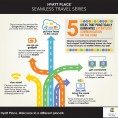Looking for tips on how to connect with and inspire Millennials to take action? They’re the generation that seems to understand technology better than anyone, which begs the question: What does it take to influence natural-born influencers? To find out, we spoke with Jeff From, president of FutureCast and author of Marketing to Millennials: Reach the Largest & Most Influential Generation of Consumers Ever. As we point out in our own bestselling book Millennial Marketing: Bridging the Generation Gap, the answers may be simpler than you think:
Q: What constitutes a Millennial in your mind? And what notable characteristics, behaviors, and perspectives most define this generation from your standpoint?
A: Most people define millennials by birth year; however, we think it encompasses more than that. Millennials are defined by the millennial mindset. The Millennial mindset includes: A behavior, not an age; hyper connectivity; changes in content consumption patterns; inclusivity; fairness (social responsibility, transparency); a thirst for affordable adventure.
Q: What are some of the most important trends and happenings we’re seeing emerge amongst people who hail from this age group?
A: The three things I see:
- Millennials are more likely to value badge experiences rather than badge products. For example, millennials do not care about a $10,000 Rolex watch but they will save up for a $10,000 trip to Thailand.
- Peer networks are replacing traditional experts. Platforms like Kelly Blue Book, Monster.com and Yelp are becoming the go-to sites for product and service recommendations.
- Acceptance of new schemas that make utility a priority are replacing old schemas.
Q: What are a few unexpected things people would never guess about members of this generation?
A: Millennials are quickly becoming the youngest generation of parents in our market today. Already one in four Millennials are parents and there are 11.6 million millennial households with kids under the age of 18 in the U.S. This transition into parenthood is shaping Millennials into a widely pragmatic generation that seeks out brands that can help to make their lives easier, better and more efficient. We are also seeing greater affluence take shape among the female population of Millennials. Our new research proves that among affluent millennials, 64 percent are women.
Q: How does this generation fundamentally differ from those which came before?
A: Millennials are more likely than members of previous generations to embrace inclusivity and have a fundamental belief in fairness. They expect brands to incorporate these themes into their entire business ecosystem. Millennial parents are also teaching their children these values and as a result we are seeing members of the Gen Z population take these values to the next step. Millennials are also the first generation to be born into the digital era. Unlike previous generations, they are digital, mobile and social natives. This digital nativity helps millennials navigate through a market where infinite choice has the propensity to be overwhelming.
Q: How might Millennials be unexpectedly similar to other generations in ways casual observers might not expect?
A: Like consumers from all generations, Millennials are always on the lookout for a good deal. They are convenience and price-driven shoppers and will reward the brands that offer them the most bang for their buck.
Q: How are Millennials changing the way we communicate and interact?
A: Millennials engage with brands in real-time and want snackable content that is personalized for them and their networks.
Q: How are Millennials changing the way we do business?
Millennials are day traders and embrace a trade up/trade down mentality. This means that while Millennials are budget shoppers, they will trade up and pay the premium for brands that they deem worthy.
Brands must determine if they are trying to reach the millennial that is going to trade up or the millennial that is going to trade down.
Q: How is this generation changing the world? What kind of impact has it had on our society already?
A: Sixty four percent of Millennials say it is a priority to make the world a better place. But, they want to do so with the brands they love most – as a partnership. This means that brands must act as conscious capitalists and generate opportunities for millennials to co-create a better planet.
Q: What influences most shape Millennials today? What influences have shaped them in the past? How are they reshaping the rest of our attitudes, and those of other generations?
A: Three things:
- Millennials constantly seek peer-affirmation and will not make a purchase (big or small) without first checking in with their friends and personal networks.
- Many Millennials were graduating college and entering the work force at the peak of the housing crisis and Great Recession in 2008. High rates of unemployment along with high levels of student debt have shaped the pragmatic lens that Millennials view the market through.
- Millennials are life hackers and are constantly looking for brands to create innovations that embrace the “useful is the new cool” mindset.
Q: What are some of the best and most effective ways to connect with and speak to members of this generation?
A: Three things:
- An emphasis on authentic and transparent marketing – don’t try to keep secrets. The most inspired brands today are winning Millennial love because they are honest about what is happening behind closed doors. Think about Chipotle and its decision to remove carnitas from select menus because of poor management on farms. Rather than be upset about the smaller menu, Millennials applauded Chipotle for standing for more than their bottom line and being honest about the cause for the change.
- Create opportunities for co-creation – Millennials have more stake in the brands they interact with and want to be included in the creation process for the entire brand journey from start to finish.
- Don’t expect all Millennials to act the same way – even though we have a tendency to group consumers together, it would be a shame to assume that all Millennials behave in the same way. This is a generation that is beginning to enter parenthood and those who have children have extremely different buying habits and attitudes than those who don’t.
Q: How do Millennials’ daily, social and professional habits differ from other generations – and what would those hoping to communicate with them do well to know about these shifts?
A: Millennial consumers curate and create more content more rapidly and in smaller chunks than any other group of people in our market today.
Q: What advice would you give businesses or brands hoping to more effectively engage Millennials?
A: Most companies would be well served trying to act on the four pillars of Millennial engagement as opposed to simply generating more awareness of the products they already have. The four pillars are: innovation, authenticity, uniqueness and meaning.
Q: More and more Gen Yers are moving online for their news, information, shopping. What’s the best way to capture their attention and interact with them these days?
A: It’s important to realize that for marketers, there is a difference between digital and physical (think New York Times newspaper and the New York Times app). Millennials, however, do not see the difference. For them, those two things are one in the same. Millennials are not shopping, researching, learning on their phones OR in the stores, they are doing it all at the same time. Creating an omni-channel presence that’s exists in multiple environments on a variety of different platforms is the key to keep this hyper-connected and easily distracted generation engaged.
Q: What does success look like for today’s Millennial in your opinion, and what’s driving them as they go about making decisions in business and life?
A: It’s a myth that Millennials don’t care about money. However, they care about more than JUST money. Millennials firmly believe in a work/life balance and the opportunity to do interesting things. It is not work OR life it is work AND life.
For more on how to effectively manage, lead, and communicate with every generation, be sure to check out Millennial Marketing: Bridging the Generation Gap.














